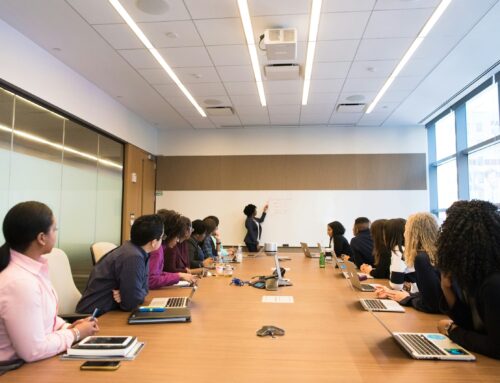By Randy Hain. Average players want to be left alone. Good players want to be coached. Great players want to be told the truth. – Doc Rivers, NBA Coach & Former Player
One of the most important elements of a successful executive coaching engagement is a thorough 360 interview process where a group of colleagues around the coaching client are thoroughly interviewed and their anonymous candid feedback is shared in confidence with the coaching client. I have conducted thousands of 360 interviews over the years for my coaching clients and I would like to share a powerful learning from this process: Leaders are often surprised by the majority of the 360 feedback they receive.
In my experience, leaders are often operating without a clear understanding of how they are perceived by those around them. Does this sound familiar? It should set off your internal alarm bell when work colleagues do not share honest feedback or are more comfortable sharing candid feedback with a third-party coach, then you. It is important for all leaders to frequently look in the mirror and conduct an exercise in self-reflection. Perhaps answering these difficult questions may assist your efforts:
Do I really know how I am showing up at work with my colleagues each day? Am I truly self-aware?
Do I feel like I am operating at a surface level with them in terms of our relationships? Do I really know them? Do they really know me? Have I been vulnerable and authentic with them and them with me?
Do I trust my colleagues and have I earned their trust?
Do I typically receive only positive feedback and affirmations? Do I only seek feedback from a small circle of friends at work?
Am I approachable? Do I make it psychologically safe for people to give me critical feedback? Do I actually want to hear it? Do I sincerely ask for it?
Reframing Our Thinking
As much as I personally value helpful feedback, I have observed over most of my career that the idea of asking for feedback is difficult for some. The act of asking for candid feedback can indeed be one of the scariest things we do as professionals, but it does not have to be this way. We may fear the comments will be painful or our flaws will be exposed. Instead, I suggest we reframe our thinking to consider that the feedback we receive from colleagues and clients can help us adjust our approach, fix major issues before they get out of control, or affirm we should stay the course. You may also be missing out on game-changing ideas by not gathering feedback from a diverse group of colleagues. Feedback can and should be considered a gift, not something to avoid.
Asking the Wrong Questions
When I was in the early years of my career, I recall frequently asking my bosses and co-workers, “Am I doing OK?” and “Are we good?” or “Do you have any advice for me?” in an effort to improve and accelerate my career. The generic feedback and accolades I typically received were rarely helpful and often frustrating; I yearned for something more candid and substantial to assist in my professional growth. This continued until one boss/mentor of mine challenged me to change how I was asking for feedback in order to get the input I desired and needed. I needed to be much more specific and vulnerable in my questions. His timely and helpful advice, which I have utilized for decades, is the basis for much of what you will read in this post.
Hare are nine best practices to help you recalibrate (or hopefully affirm) the approach you are taking to gathering critical feedback from your colleagues at work:
- Practice humility. Asking for candid feedback requires us to check our egos and pride at the door and recognize we don’t have all the answers, we may not be truly self-aware of how we are showing up and that we need our work colleagues to help us be successful. Pride is the enemy of effective leadership.
- Promote psychological safety. People around you should never be afraid to share their candid thoughts with you. If they are afraid, you will not achieve the success you desire. Make is safe from them to share without repercussion, in private, their insights, observations, and suggestions.
- Sincerely give people permission to be candid. Here is a helpful example: “Susan, I really need to hear your candid thoughts on the project. Please share what you are really thinking without holding back, or I can’t be of much help. What are two or three things I can do to better support you to meet the deadline?” Repeatedly giving this permission to be candid may eventually unlock useful feedback we can use. It will also help the giver feel psychologically safe as well as overcome any potential intimidation or discomfort they may be experiencing with you.
- Make it timely. Ask for private feedback soon after the event/issue/conversation occurred. Don’t wait too long!
- Gather the feedback in person. Ask for feedback in person if at all possible. Virtually or via a phone call are acceptable, but not as effective as in-person. Do not ask for feedback in an email or by sending a survey.
- Be a continuous learner. Remember to approach your overall role as one of a continuous learner. This attitude will set you up to welcome the feedback process with open arms. We all have skills, behaviors, or technical expertise we can improve
- Avoid defensiveness. Listen carefully to the feedback and consider the possible truth in what you are hearing. Avoid appearing defensive at all costs, which will likely discourage that person from sharing feedback in the future. This will require vulnerability and humility on your part, as well as some degree of self-control.
- Be specific. Always be specific when asking for feedback. For example: “I think I could have done a better job presenting in our staff meeting yesterday. What are one or two different ways I could have shared the information?” or “What is one thing I can do to better support you for the rest of this year?” or “What is one thing I need to stop doing to help our team be more successful?” Specific questions like this will typically receive a substantive answer you can use versus a perfunctory “yes,” “no,” or “you are amazing!” that are typical responses to generic questions like “Is everything ok?”
- Sincerely thank the giver. It takes courage to speak candidly about difficult topics, and you want the person that gave the feedback to feel comfortable doing it again in the future. Remember, without feedback, we operate in a vacuum and restrict our own growth and development. Be grateful for any feedback you receive.
Another aspect of seeking feedback is accurately identifying our intended audience. We often gravitate to close friends and colleagues we like, but who rarely say anything critical (yes, there may be exceptions). To truly benefit from a candid feedback conversation, seek out people directly affected by your work who are not close personal friends or who have a reputation for being direct. The goal of seeking candid feedback should not be accolades and validation, but genuine insights that will spur opportunities for learning and growth.
Once you receive this developmental and helpful feedback, consider these next steps:
- Review everything you’ve heard and identify the changes you can make immediately.
- Identify the changes that may require more time or additional help and develop a step-by-step strategy to put them into action.
- Request time for another conversation with the feedback provider(s) in the coming weeks or months to assess your progress. This will help keep you accountable for applying the changes.
The helpful and candid feedback I have received over the years has sometimes been difficult to hear—but ultimately transformative in my professional and personal development. I encourage you to put these best practices to work and notice the impact these feedback discussions have on the way you approach every aspect of your work and life.
We can all get better, but operating in a cocoon will severely limit our progress. If we want to stop flying blind and reach our full potential, re-think how we can harness the power of candid feedback, starting today. Good luck!
Do the self-reflection exercise near the top of this post. Ponder what you learn from it. How will you be more intentional about seeking candid feedback from others, beginning this week?








